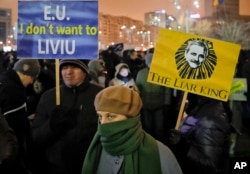Over the past two weeks, Romania has seen Eastern Europe's largest protests since the fall of communism in 1989.The demonstrations center on corruption, and they continue even after the government survived a no-confidence vote.
For the West, the crisis represents a dilemma in which people on the streets of Bucharest are exposing a darker side of the government's anti-corruption efforts that have been much lauded by the United States and the European Union. To many of the demonstrators, the anti-corruption fight itself has become corrupt.
Angered by a recent move to decriminalize corruption offenses below a $50,000 threshold, demonstrators want the government to quit.
The government reversed the decree, but the protests continued. Many believe that leaders are using anti-corruption laws to smash the political opposition, with tactics similar to those employed by the communist government of the late longtime ruler Nicolae Ceausescu.
Anti-corruption leader
The protests have cast a spotlight on Laura Kovesi, the woman who heads Romania's anti-corruption directorate, known as the DNA.
On Kovesi's watch, the DNA has boasted a conviction rate topping 90 percent, with guilty verdicts being handed to the likes of a prime minister and other top government officials. To her supporters, the figure represents an impressive achievement in the fight against corruption. To her critics, it is evidence of a system that is rigged in a way not seen since the communist era, when trials were often held only for show.
In Britain and elsewhere in the West, there have been warnings for years of what some analysts say is a corruption crisis that could bring embarrassment, or at the very least a reassessment of support for what has been a staunch and favored ally of Washington on Europe's eastern flank.
As some in the rest of Europe see it, the integrity of the region is at stake. Romania has been a member of the EU since 2007 and is a part of NATO.
"If Romania is not adhering to democratic standards that are supposed to bind not just members of the European Union, but also members of the Council of Europe, members of the [Organization for Security and Cooperation in Europe], then it becomes a problem because it creates a potential for the Putinization of parts of Europe and that sort of creeping return of authoritarian and anti-democratic practices which are incompatible with the kind of Europe that we've been trying to build since 1989," said David Clark, a former special adviser to the British Foreign Office.
Steadfastly pro-Western
But condemning Romania, demanding thorough reforms and threatening expulsion from the EU are difficult notions for Washington and other nations in the West to embrace.
Since 1989, Romania has been steadfastly pro-Western and relations between Bucharest and Washington have remained consistently robust. The two countries have a number of security agreements that the U.S. sees as crucial in a sensitive and important region. In addition to hosting hundreds of U.S. troops and elements of U.S. missile defense systems, Romania has contributed troops and equipment over the years to NATO efforts in Afghanistan, Iraq, Libya and Kosovo.
But some politicians and Romanian exiles in Britain have for years warned that ignoring the corruption problems in the country could prove harmful to American and Western interests in the long run.
"I think the biggest danger for the United States is that it could lose its credibility in Romania," said Alexander Adamescu, a London businessman whose father, Dan Adamescu, a billionaire owner of an opposition newspaper, died of blood poisoning last month in Romania. Authorities had imprisoned him on corruption charges that his family, lawyers and international human rights advocates said were politically motivated.
Human rights reputation
The United States, the younger Adamescu told VOA, could "lose the status it has enjoyed thus far as the power that's protecting Romania from all kinds of evil in the region by ignoring the problems on the anti-corruption front and just blindly supporting" the country's anti-corruption efforts. "It is putting in danger the long-standing assumption, the belief that the United States are defenders of democracy, separation of powers and human rights."
Kovesi's efforts have received praise from Western officials, including Americans. But some analysts say the longer the protests continue, the more likely the West will start to reassess its opinion of her and the effort she leads.
"They've accepted the PR on this. Laura Kovesi has been very effective at projecting herself internationally as a great crusader against crime," Clark said. "Laura Kovesi's international reputation is one that should be subjected to much more serious scrutiny and consideration."








